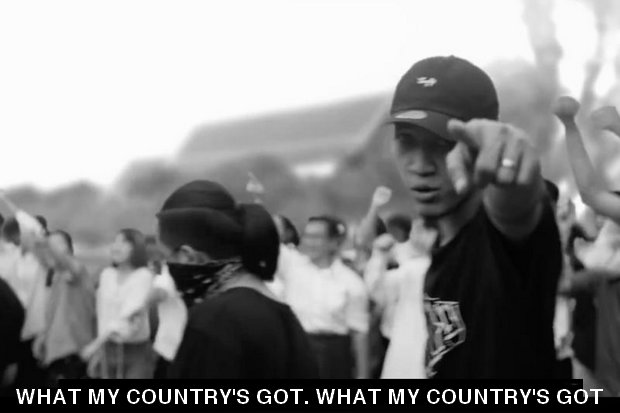
Rhymes and misdemeanours. Yo, yo. Rappers are threatened to be thrown in a slammer.
Yo yo, why are you so scared of someone in loose jumpers? Count one, count two, count five, count 10 million viewers.
The world has Daft Punk, but yo, Thailand has a bunch of daft dictators.
The RAD rappers are in the hot water, and I'm no match for them in the art of one-liners.

Kong Rithdee is Life editor, Bangkok Post.
Rap Against Dictatorship's Prathet Ku Mee ("What My Country's Got") -- a five-minute, fire-breathing track that disses all that's wrong with the country in the present -- is being called a security threat and a negative influence that will jeopardise the country's economy. Yawn, yawn. The same old rhetoric from those who can't stand truth being spoken in their ears, in verse or in prose, in a music video or in newspapers.
The music video, I must say, is arresting (pun intended). Shot in black-and-white by Teerawat Rujintham, it features the RAD group members rapping about corruption, the watch scandal, the killing of the black leopard and other ills of this great nation, while the background is a re-staging of the Oct 6, 1976 massacre at Thammasat University.
The tone is that of brutal sarcasm: The anger, raw energy and honesty of the lyrics play against the laughing crowd in the back, the laugh of ignorance and casual barbarism that chills the spine. It ends with the inevitable, again a remake of the Oct 6 violence: a maimed corpse hanging from on a tree while a man bashes it with a chair.
The video is a courageous visual construction that takes political cinema in Thailand to the next level. It works because it is at once literal and metaphorical, a punch in the gut and a cold bath on the night of murders -- it's about the present but with its eyes firmly fixed in our irresolvable past. And its power rightly pricks the right with such heated precision that they now want to hang these guys in the town square and bash them with a piece of furniture, or whatever is nearest to them.
The government spokesman voiced his displeasure (against a song that, prior to the brouhaha, had just a few hundred thousand views). The police are seething and threatening to press charges. Even those who share the video online are at risk of being roped into the feared computer crime charges. The thrashing-about by these people in power, in short, is quite spectacular, and it makes everyone wonder, why such a fuss? For God's sake, it's just a music video from a group that's largely unknown, and the more they treat it as if it was a nuclear warhead, the more it becomes increasingly like one on a path to nuke the sanity of the people.

Censorship of the arts is counter-productive, the authorities should've learnt that lesson a long time ago. And I mean this for every government, not just the military one. The Oct 6 re-enactment -- that horror we never came face to face -- put another film in trouble before: Shakespeare Must Die in 2012, directed by Ing K and Manit Sriwanichpoom, was banned outright by the Ministry of Culture during the Pheu Thai government, and the broad, confusing explanation concerned the film's depiction of greed, lust for power and the restaging of the harrowing chair-bashing. Before that, the Democrat government also banned a film called Insects in the Backyard because of nudity and other "inappropriate" portrayals.
Nobody can stand radical artists, and that's why we need more of them.
At a time when journalists are no longer free to speak their minds, artists have to step in. The peddlers of truth also need help from the merchants of metaphors. Journalism and art may seem like the two ends of the spectrum, but in our strange times they share the same mission of waking people up from their slumber -- the dead man has to be woken, and if newspapers can't do that job then rappers, filmmakers, painters and visual artists have to cast their spells. We're in this together.
You may say that Thailand isn't as bad as, say, Myanmar, where reporters can be jailed for simply reporting, or Saudi Arabia and Turkey, where what happened was plain for all to see. But to say that we don't have censorship here is naïve. The rapper case is a blatant, high-profile example of state intimidation, but in this climate of censorship it is also applied in other forms, in whispers, in warnings, in meeting rooms, in cupped hands and embarrassed smiles, in the "requests" from the authorities or corporate executives wanting to please the powers that be. That's why these RAD rappers are such a sensation, that's why so many people support them: they're performing a journalistic duty. To persecute them means you're persecuting journalism. That's unacceptable.
